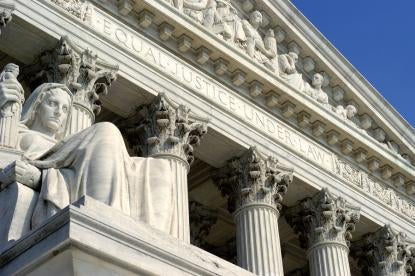In Nebraska v. Parker, 2016 WL 1092417 (U.S. 2016), the Omaha Tribe had entered into a treaty with the United States in 1865 ceding tribal lands and establishing a 300,000 acre reservation. In 1882, Congress enacted a law authorizing the Secretary of the Interior “to cause to be surveyed, if necessary, and sold” more than 50,000 acres of reservation land lying west of a right-of-way granted by the Tribe and approved by the Secretary of the Interior in 1880 for use by the Sioux City and Nebraska Railroad Company. The act provided further that after tribal members had been given the opportunity to select 160-acre allotments, the tract would be opened for settlement by non-Indians. Ultimately, just 10 to 15 tribal members selected allotments west of the right-of-way and the area was eventually settled by non-Indians, one of whom founded the Village of Pender. The act required the Secretary to deposit the proceeds of sales to non-Indians in the U.S. Treasury for the Tribe’s benefit.
In 2006, the Tribe sought to subject Pender retailers to its newly amended Beverage Control Ordinance, which required retailers to obtain a liquor license, costing $500, $1,000 or $1,500 depending upon the class of license, and imposed a 10 percent sales tax on liquor sales. Nonmembers who violated the ordinance were subject to a $10,000 fine. The Village and business owners, later joined by the State of Nebraska, sued, contending that the 1882 act had diminished the reservation and that Pender was no longer within its boundaries.
The Village sought to leverage the Supreme Court’s “justifiable expectations” equitable doctrine from the 2005 City of Sherrill decision, emphasizing that the Tribe was “almost entirely absent from the disputed territory for more than 120 years,” had not attempted to enforce any of its other regulations (e.g., governing businesses, fire protection, animal control, fireworks, and wildlife and parks), maintained no office, provided no social services and conducted no tribal celebrations or ceremonies west of the right-of-way.
The district court rejected the Village’s arguments, concluding that the 1882 act had not diminished the reservation. The Eighth Circuit Court of Appeals agreed with the district court and the U.S. Supreme Court, on March 22, affirmed, applying the principles established by its 1984 Solem v. Bartlett decision: “Only Congress can divest a reservation of its land and diminish its boundaries, and its intent to do so must be clear. … This subsequent demographic history cannot overcome our conclusion that Congress did not intend to diminish the reservation in 1882. And it is not our role to ‘rewrite’ the 1882 Act in light of this subsequent demographic history.”
In his opinion for a unanimous Court, Justice Thomas was careful to keep alive the Village’s potential challenge to the Tribe’s regulatory authority in the portion of the reservation occupied by non-Indians: “Petitioners’ concerns about upsetting the ‘justifiable expectations’ of the almost exclusively non-Indian settlers who live on the land are compelling, … but these expectations alone, resulting from the Tribe’s failure to assert jurisdiction, cannot diminish reservation boundaries. … Because petitioners have raised only the single question of diminishment, we express no view about whether equitable considerations of laches and acquiescence may curtail the Tribe’s power to tax the retailers of Pender in light of the Tribe’s century-long absence from the disputed lands.”



 i
i

